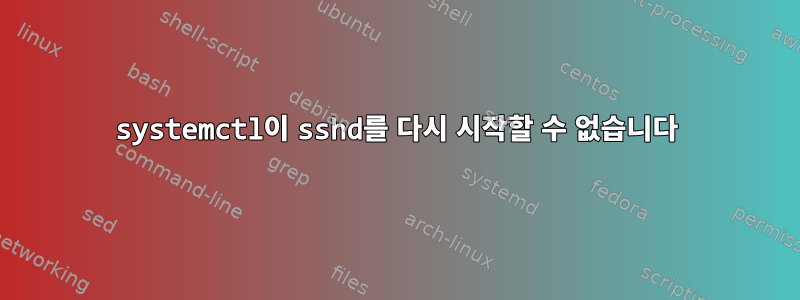
뭔가 이상한 일이 일어났습니다:
systemctl을 통해 SSHD를 시작할 수 없습니다.
SERVER:~ # systemctl status sshd
● sshd.service - OpenSSH Daemon
Loaded: loaded (/usr/lib/systemd/system/sshd.service; enabled; vendor preset: disabled)
Active: inactive (dead)
May 29 18:31:38 linux-uw9h systemd[1]: Stopped OpenSSH Daemon.
May 29 18:45:19 SERVER systemd[1]: Stopped OpenSSH Daemon.
May 29 18:48:09 SERVER systemd[1]: Stopped OpenSSH Daemon.
May 29 19:04:23 SERVER systemd[1]: Stopped OpenSSH Daemon.
May 29 19:09:51 SERVER systemd[1]: Stopped OpenSSH Daemon.
May 29 19:11:22 SERVER systemd[1]: Stopped OpenSSH Daemon.
May 29 19:12:53 SERVER systemd[1]: Stopped OpenSSH Daemon.
May 29 19:13:58 SERVER systemd[1]: Stopped OpenSSH Daemon.
May 29 19:15:09 SERVER systemd[1]: Stopped OpenSSH Daemon.
May 29 19:24:41 SERVER systemd[1]: Stopped OpenSSH Daemon.
SERVER:~ #
SERVER:~ # systemctl restart sshd
...그냥 멈췄어
하지만 "/usr/sbin/sshd"를 수동으로 입력하면 제대로 작동하기 시작합니다!
Q: 이 문제를 어떻게 디버깅할 수 있습니까?
SERVER:~ # rpm -qf /usr/sbin/sshd
openssh-7.2p2-74.16.3.x86_64
SERVER:~ # rpm -V openssh-7.2p2-74.16.3.x86_64
SERVER:~ # echo $?
0
SERVER:~ #
- dmesg는 특별한 것이 없다고 말합니다.
- /var/log/* 특별한 것은 없습니다
- Journalctl -xe에는 특별한 내용이 없습니다.
- -f openssh의 zypper는 도움이 되지 않습니다.
- FS는 100%가 아닙니다.
- 콘솔에 하드웨어 문제가 표시되지 않음
- 이미 두 번 다시 시작했습니다.
- 네트워크/IP는 괜찮아 보이고 SSHD가 실행 중인 경우 작동합니다.
- "systemctl 비활성화 sshd"를 시도하고 활성화했지만 도움이 되지 않았습니다.
systemctl은 시작할 수 없지만 수동으로 시작할 수 있습니다.
SLES 12.3.
2019년 5월 30일에 업데이트됨:
sshd.service 파일의 cksum은 다른 작업자 노드와 동일합니다.
SERVER:~ # cat /usr/lib/systemd/system/sshd.service
[Unit]
Description=OpenSSH Daemon
After=network.target
[Service]
Type=notify
EnvironmentFile=-/etc/sysconfig/ssh
ExecStartPre=/usr/sbin/sshd-gen-keys-start
ExecStartPre=/usr/sbin/sshd -t $SSHD_OPTS
ExecStart=/usr/sbin/sshd -D $SSHD_OPTS
ExecReload=/bin/kill -HUP $MAINPID
KillMode=process
Restart=always
TasksMax=infinity
[Install]
WantedBy=multi-user.target
SERVER:~ # ls -lah /usr/lib/systemd/system/sshd.service
-rw-r--r-- 1 root root 361 Jan 30 15:46 /usr/lib/systemd/system/sshd.service
SERVER:~ #
최악의 경우 sshd를 확인하기 위해 매분마다 cronjob을 설정해야 하므로 systemctl이 시작할 수 없으면 시작합니다.
2019년 5월 31일에 업데이트됨:
SERVER:~ # strace systemctl restart sshd
execve("/usr/bin/systemctl", ["systemctl", "restart", "sshd"], [/* 57 vars */]) = 0
brk(0) = 0x562494677000
access("/etc/ld.so.preload", R_OK) = -1 ENOENT (No such file or directory)
open("/etc/ld.so.cache", O_RDONLY|O_CLOEXEC) = 3
fstat(3, {st_mode=S_IFREG|0644, st_size=102550, ...}) = 0
...
recvmsg(3, {msg_name(0)=NULL, msg_iov(1)=[{"l\4\1\1H\0\0\0\3\0\0\0\206\0\0\0\1\1o\0!\0\0\0", 24}], msg_controllen=0, msg_flags=MSG_CMSG_CLOEXEC}, MSG_DONTWAIT|MSG_NOSIGNAL|MSG_CMSG_CLOEXEC) = 24
recvmsg(3, {msg_name(0)=NULL, msg_iov(1)=[{"/org/freedesktop/systemd1/job/22"..., 200}], msg_controllen=0, msg_flags=MSG_CMSG_CLOEXEC}, MSG_DONTWAIT|MSG_NOSIGNAL|MSG_CMSG_CLOEXEC) = 200
recvmsg(3, {msg_name(0)=NULL, msg_iov(1)=[{"l\2\1\0012\0\0\0\4\0\0\0\17\0\0\0\5\1u\0\2\0\0\0", 24}], msg_controllen=0, msg_flags=MSG_CMSG_CLOEXEC}, MSG_DONTWAIT|MSG_NOSIGNAL|MSG_CMSG_CLOEXEC) = 24
recvmsg(3, {msg_name(0)=NULL, msg_iov(1)=[{"\10\1g\0\1o\0\0-\0\0\0/org/freedesktop/sys"..., 58}], msg_controllen=0, msg_flags=MSG_CMSG_CLOEXEC}, MSG_DONTWAIT|MSG_NOSIGNAL|MSG_CMSG_CLOEXEC) = 58
sendmsg(3, {msg_name(0)=NULL, msg_iov(2)=[{"l\1\4\0019\0\0\0\3\0\0\0\240\0\0\0\1\1o\0-\0\0\0/org/fre"..., 176}, {"\35\0\0\0org.freedesktop.systemd1.Uni"..., 57}], msg_controllen=0, msg_flags=0}, MSG_DONTWAIT|MSG_NOSIGNAL) = 233
recvmsg(3, 0x7ffc4c442360, MSG_DONTWAIT|MSG_NOSIGNAL|MSG_CMSG_CLOEXEC) = -1 EAGAIN (Resource temporarily unavailable)
ppoll([{fd=3, events=POLLIN}], 1, {24, 999977000}, NULL, 8) = 1 ([{fd=3, revents=POLLIN}], left {24, 999901280})
recvmsg(3, {msg_name(0)=NULL, msg_iov(1)=[{"l\2\1\1\10\0\0\0\5\0\0\0\17\0\0\0\5\1u\0\3\0\0\0", 24}], msg_controllen=0, msg_flags=MSG_CMSG_CLOEXEC}, MSG_DONTWAIT|MSG_NOSIGNAL|MSG_CMSG_CLOEXEC) = 24
recvmsg(3, {msg_name(0)=NULL, msg_iov(1)=[{"\10\1g\0\1v\0\0\1b\0\0\0\0\0\0", 16}], msg_controllen=0, msg_flags=MSG_CMSG_CLOEXEC}, MSG_DONTWAIT|MSG_NOSIGNAL|MSG_CMSG_CLOEXEC) = 16
recvmsg(3, 0x7ffc4c442410, MSG_DONTWAIT|MSG_NOSIGNAL|MSG_CMSG_CLOEXEC) = -1 EAGAIN (Resource temporarily unavailable)
ppoll([{fd=3, events=POLLIN}], 1, NULL, NULL, 8
여기에 멈췄습니다. 몇 시간 후에 CTRL+C를 눌러 편집하세요. sshd는 systemctl을 통해 시작되지 않고 수동으로만 시작할 수 있는데 이상합니다.
답변1
자신이 작성한 파일로 테스트해보고 sshd.service, 넣고 /etc/systemd/system호출 my-ssh.service해서 사용해 보세요.
# /usr/lib/systemd/system/sshd.service
[Unit]
Description=OpenSSH server daemon
After=network.target
[Service]
Type=notify
#EnvironmentFile=-/etc/sysconfig/sshd
#ExecStart=/usr/sbin/sshd -D $OPTIONS $CRYPTO_POLICY
ExecStart=/usr/sbin/sshd -Dd
ExecReload=/bin/kill -HUP $MAINPID
KillMode=process
Restart=on-failure
RestartSec=42s
[Install]
WantedBy=multi-user.target
저는 Fedora 사이트 중 하나에서 위 서비스를 가져와서 ExecStart를 교체하고 -d디버깅 기능을 추가했습니다. 라는 파일을 만들고 /etc/systemd/system/my-ssh.service위의 코드 조각을 넣은 후 다음 명령을 사용하여 systemd를 다시 로드합니다.
systemctl daemon-reload
그런 다음 서비스를 실행해 보세요.
systemctl start my-ssh ; journalctl -f --unit=my-ssh
그리고 로그를 찾아보세요journalctl -f --unit=my-ssh


